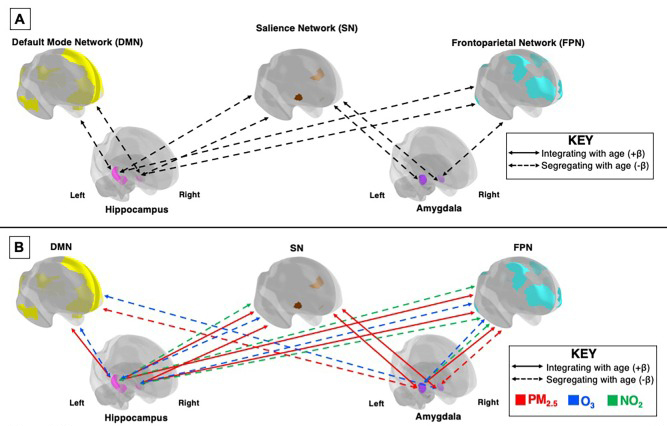A recent study has revealed concerning findings about the impact of air pollution on the developing brain, even at levels considered safe.
The researchers used brain scan data from over 9,000 participants in the Adolescent Brain Cognitive Development (ABCD) study. This was the largest nationwide study of youth brain health in the United States.
The researchers used brain scan data from over 9,000 participants in the Adolescent Brain Cognitive Development (ABCD) study. This was the largest nationwide study of youth brain health in the United States.

Longitudinal changes seen with age from 9 to 13 years in cortical-to-subcortical functional connectivity.
To explore the relation between air pollution and brain development, Herting and her team analyzed functional MRI scans from 9,497 participants aged 9-10 from the ABCD study. They then selected a subset of this cohort for collecting additional scans two years later to assess how brain connectivity changed over time.
The experts found that children exposed to air pollutants showed significant changes in connectivity between various brain areas. They found more connections than normal in certain brain regions, and fewer in others.
The research suggests that exposure to air pollution during critical periods of brain development can lead to long-lasting negative effects, including cognitive and behavioral impairments. The study underscores the importance of reducing air pollution levels to safeguard the health and well-being of young individuals. Efforts to improve air quality and protect the developing brain are crucial for ensuring a healthier future generation.
Thus, the current findings should be taken into consideration by regulatory bodies as they set guidelines for acceptable levels of pollutants for the general population to optimize public health.
The study is published in the journal Environment International.
The experts found that children exposed to air pollutants showed significant changes in connectivity between various brain areas. They found more connections than normal in certain brain regions, and fewer in others.
The research suggests that exposure to air pollution during critical periods of brain development can lead to long-lasting negative effects, including cognitive and behavioral impairments. The study underscores the importance of reducing air pollution levels to safeguard the health and well-being of young individuals. Efforts to improve air quality and protect the developing brain are crucial for ensuring a healthier future generation.
Thus, the current findings should be taken into consideration by regulatory bodies as they set guidelines for acceptable levels of pollutants for the general population to optimize public health.
The study is published in the journal Environment International.
